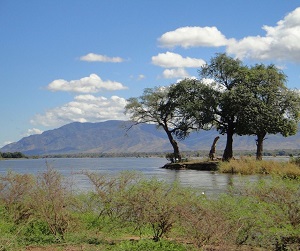 |
|
|

Zambia is a country located in south-central Africa with no access to the ocean, bordered by the Democratic Republic of the Congo to the north, Angola to the west, Tanzania and Malawi to the east, and Mozambique, Zimbabwe, Botsawa and Namibia to the south. The territory consists of a series of plateaus with heights between 1000 and 2000 meters, interrupted by rivers and hilly areas.
The country is quite rich in water both as regards the rivers, (Zambezi, 2,700 km in total, the Kafue, 1,600 km, and the Luangwa 800 km), and as regards the lake basins, among which the most important are the Tanganyika. (2,100 Km² the Zambian part, 32,893 Km² in total), and Lake Mweru, (5,120 Km² in total).
The typical tropical climate, with the dry season between April and October, the wet and rainy season between November and March, together with the richness of the water basins, make Zambia a precious naturalistic and biodiversity treasure peculiarity of the African Continent.
The capital Lusaka rises at an altitude of 1,300 meters and has a population of 2,204,000 inhabitants, (3,270,000 considering the urban agglomeration).
Climate Change increases the difficult living conditions: the country is brought to its knees by the fact that small landowners, who produce almost all of its food needs, due to late rains, prolonged droughts, temperatures extremely high and flooding, are unable to meet the demand for food.
Memorandum of Understanding (November 2018 – nNovember 2023) |
Counterpart: Ministry of National Development of the Republic of Zambia
Allocation: 2 million Euros, integrable
Intervention areas:
- Collection, analysis and dissemination of data relevant to the observation of climate change and the measurement of its impact on the potentially vulnerable economic sectors;
- Support to the implementation, monitoring, reporting and communication of the Nationally Determined Contributions (NDCs);
- Promotion of sustainable forest management, including reduction of deforestation and forest degradation, (REDD+), and enhancement of afforestation and reforestation policies;
- Promotion of Climate Smart Agriculture (CSA) practices;
- Promotion of renewable energies and energy efficiency, including of off-grid renewable technologies in rural areas;
- Integrated and sustainable water management;
- Sustainable waste management;
- Integrated land use management and sustainable use of resources.
|
Documentation |
|
Updates 17/09/2020 First meeting of the Joint Committee |



